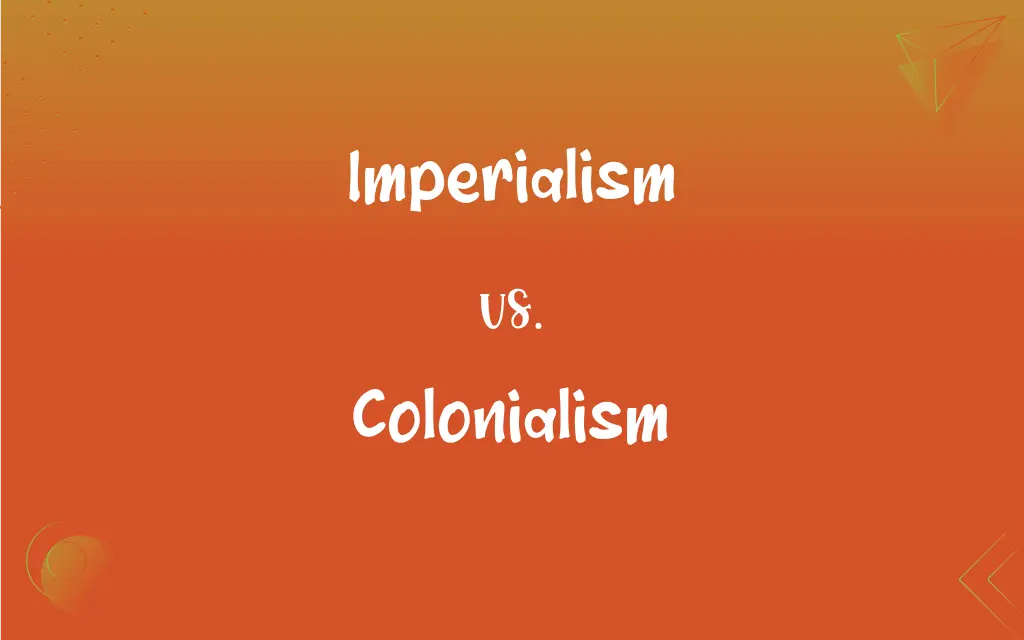Imperialism vs. Colonialism: What's the Difference?
Edited by Aimie Carlson || By Harlon Moss || Updated on October 8, 2023
Imperialism involves extending a nation's power through diplomacy or military force, while colonialism specifically involves settling and establishing control over a distant territory.

Key Differences
Imperialism signifies a policy of extending a country's power and influence through diplomacy or military force. Colonialism, conversely, involves settling into and establishing control over the indigenous people of an area. Both concepts embody the practice of domination, but they diverge in their approach and implementation.
Colonialism explicitly necessitates the migration of people to new areas, often forming colonies where they exert control. Imperialism, while also involving domination, does not necessarily require human migration and settlement, but rather asserts control or influence over areas perhaps through military force or political strategies.
Imperialism could be perceived as the broader concept, encompassing various methods, including colonialism, to achieve power extension. In contrast, colonialism is a subset, more specific in its methodology by focusing on settlement, occupation, and control of a region.
Colonialism often leads to changes in social structures and systems in the occupied territories, where settlers become a dominant power. On the other hand, imperialism might involve controlling territories without significantly altering their societal frameworks, but instead exerting influence or control over them.
Colonialism and imperialism have historically perpetuated disparities between regions and cultures, fostering an “us and them” dichotomy. Colonialism often physically manifests through settlements, while imperialism may only present itself through exerted influence, revealing both tangible and intangible manifestations of dominance, respectively.
ADVERTISEMENT
Comparison Chart
Definition
Extending power by acquiring territories or establishing dominance
Establishing and exploiting colonies in one territory by people from another territory
Method
Can be executed through various methods (military, political, etc.)
Primarily involves settlement and political control
Requires Settlement
No
Yes
Focus
Influence and control over territories
Establishing colonies and managing them
Scope
Broader, can include various forms of control
Narrower, focused on settlement and control
ADVERTISEMENT
Imperialism and Colonialism Definitions
Imperialism
Imperialism often involves the utilization of power to subjugate and control other nations or territories.
The imperialism of European nations was significantly noted in Africa and Asia.
Colonialism
It is the establishment of a colony in one territory by people from another territory.
Dutch colonialism in Southeast Asia focused extensively on the exploitation of spice trade routes.
Imperialism
Imperialism can often exploit localized regions and peoples for economic gain, utilizing their resources for the benefit of the imperial power.
Spanish imperialism sought to extract gold and other valuable resources from the Americas.
Colonialism
It involves the settlement, exploitation, and establishment of control over an area by colonizers.
The consequences of Spanish colonialism are still visible in several Latin American countries today.
Imperialism
It encompasses the practice of establishing and maintaining an empire, usually by dominating other territories.
Roman imperialism aimed at accumulating wealth and power through territorial conquest.
Colonialism
Colonialism refers to the practice of acquiring partial or full control over another country and exploiting it economically.
Portuguese colonialism in Africa involved resource extraction and the establishment of trade routes.
Imperialism
It's a policy or ideology that seeks to enhance the domain and impact of a country or entity by controlling external lands and peoples.
The imperialism practiced by the USSR post-World War II established its influence over Eastern Europe.
Colonialism
Colonialism is the policy of establishing and maintaining colonies in a territory by a political power from another territory.
British colonialism dramatically altered the social and economic structures of India.
Imperialism
Imperialism is extending a state’s power and influence through the deployment of recognized military or political force.
19th-century British imperialism expanded its influence across various continents.
Colonialism
Colonialism often leads to the domination and subjugation of the indigenous populace by an external invader.
French colonialism in Vietnam was characterized by cultural, political, and economic dominance.
Imperialism
The extension of a nation's authority by territorial acquisition or by the establishment of economic and political dominance over other nations.
Colonialism
The policy or practice of a wealthy or powerful nation's maintaining or extending its control over other countries, especially in establishing settlements or exploiting resources.
FAQs
Is imperialism inherently negative?
Views vary, but critics often highlight the oppressive and exploitative aspects of imperialism.
Can colonialism have positive effects on the colonized?
Views differ. Some highlight infrastructure or institutions left behind, while others emphasize the negative impacts.
How did imperialism affect the colonizing country?
It often brought wealth and resources but also could incite conflict, resistance, and ethical debates.
Who were the primary actors in global colonialism?
Notable colonial powers include Britain, France, Spain, Portugal, and the Netherlands.
What are the lasting impacts of colonialism?
Lasting impacts can include economic disparity, cultural erosion, and geopolitical alterations.
How does colonialism work?
Colonialism involves a powerful nation sending settlers to a place to establish control, exploit resources, and impose its culture and values on the indigenous population.
Can imperialism exist without colonialism?
Yes, imperialism can exist without colonialism through practices like establishing political dominance, exploiting resources, or influencing culture without establishing colonies.
What impact did colonialism have on indigenous populations?
Colonialism often resulted in oppression, exploitation, and sometimes decimation of indigenous populations.
Can a nation be both imperialistic and colonized?
Yes, a nation can engage in imperialism while also being subject to colonialism or imperialism by others.
Is there a difference between colonization and colonialism?
Colonization refers to the act of establishing colonies, while colonialism emphasizes maintaining and exploiting those colonies.
Why did nations pursue imperialist policies?
Motivations included economic gain, strategic advantage, spreading cultural values, and competing for power.
What is cultural imperialism?
Cultural imperialism involves spreading and imposing one's culture, values, and ways of life on another society.
What are some examples of imperial powers?
Examples include the British Empire, the Roman Empire, and the Ottoman Empire.
Did colonialism alter global economics?
Yes, colonialism played a pivotal role in shaping global trade patterns, resource distribution, and economic systems.
How did imperialism and colonialism contribute to globalization?
They often redistributed resources, merged cultures, and established interconnected trade and communication networks, forming early roots of globalization.
What was “The Scramble for Africa”?
It was a period of rapid colonization of African territories by European powers in the 19th and 20th centuries.
What is imperialism?
Imperialism is the policy or action of extending a country's power and influence through colonization, use of military force, or other means.
Are colonialism and imperialism ongoing today?
While classic colonialism has largely ended, some argue that forms of neo-colonialism and imperialism persist.
Can colonialism lead to cultural hybridity?
Yes, colonialism can result in blending and adaptation of different cultures, forming new hybrid cultures.
Were there anti-colonial and anti-imperialist movements?
Yes, numerous movements arose to resist, challenge, and overthrow colonial and imperialist rule worldwide.
About Author
Written by
Harlon MossHarlon is a seasoned quality moderator and accomplished content writer for Difference Wiki. An alumnus of the prestigious University of California, he earned his degree in Computer Science. Leveraging his academic background, Harlon brings a meticulous and informed perspective to his work, ensuring content accuracy and excellence.
Edited by
Aimie CarlsonAimie Carlson, holding a master's degree in English literature, is a fervent English language enthusiast. She lends her writing talents to Difference Wiki, a prominent website that specializes in comparisons, offering readers insightful analyses that both captivate and inform.
































































